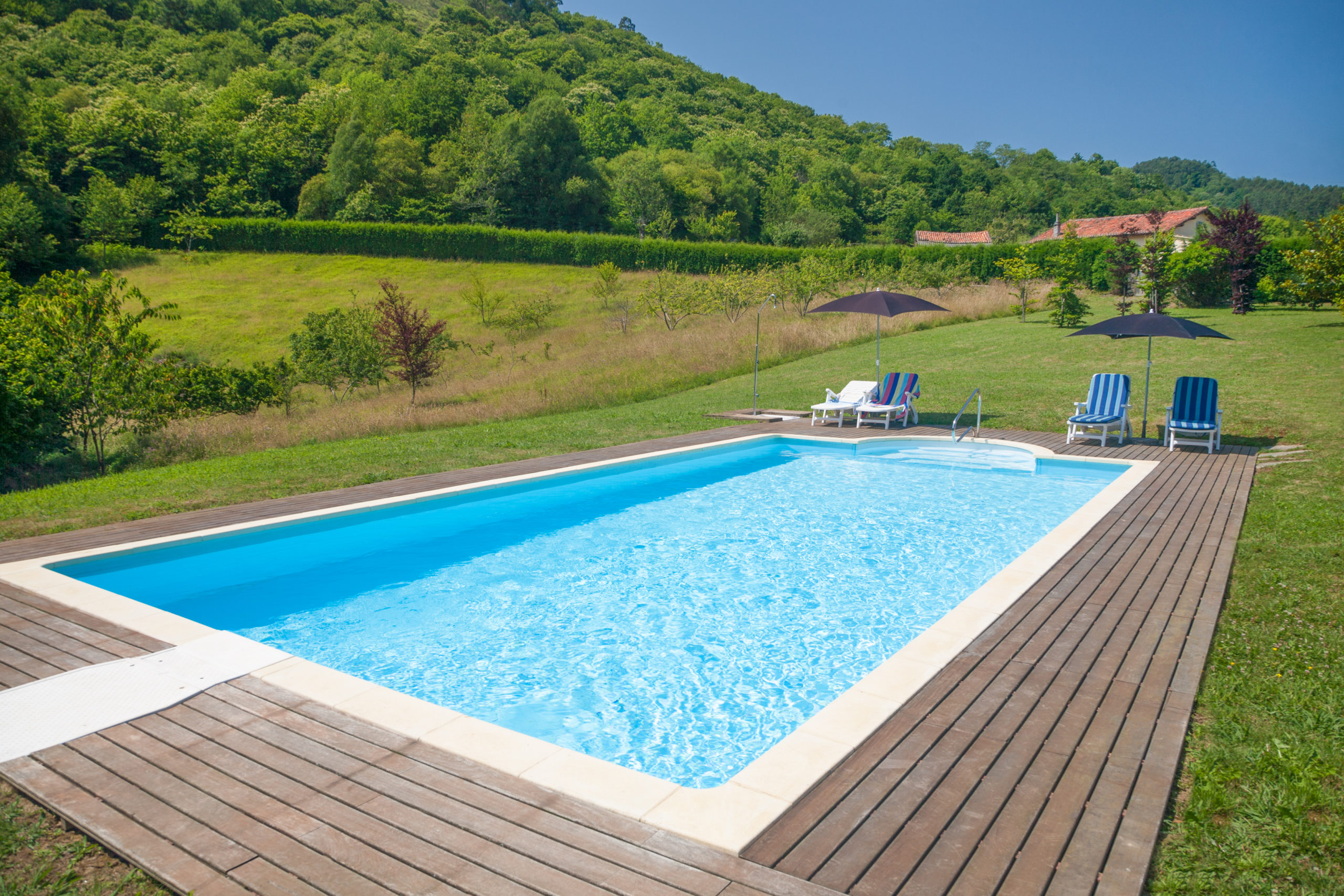Water features and swimming pools are designed to enhance the appeal and experience of your yard. It is common for homeowners to have grass close to the edge of their pools. Will pool water kill grass?
Pool Water can kill your grass – whether it’s chlorinated or saltwater – when taken to extreme volumes your grass can die. When kept in moderation all will be well.
How Chlorinated Pool Water Affects Grass
Chlorine is the main chemical added to the pool water. It disinfects, eliminates algae, and kills bacteria. Chlorine, however, while it is a powerful chemical, it is also a harmful chemical. Can your grass withstand chlorine?
Pool water with too much chlorine may affect your grass. This is so because high concentrations of chlorine can create an imbalance in the pH of the soil and kill your grass.
Small amounts of chlorine (diluted or undiluted) from your pool can cause no damaging effect on grass.
Splashes from diving and gameplay, dripping swimsuits and trunks, or wet feet are not going to have a significant effect on your grass.
These little splashes do not contain many chemicals to cause major damage.
It is a different story, though, if you empty your pool onto the grass. Some homeowners use pool water to water their grass to conserve water. A large volume of pool water getting onto your grass can cause major damage.
Emptying your pool onto grass allows the water to creep into the soil.
If you need to empty your pool for repairs or cleaning on the grass, make sure the chlorine level of the pool water is not higher than 0.1 parts per million.
A higher chlorine level can damage your grass because of the volume of chemicals.
You can also dilute your grass with water after emptying the pool to wash away the chlorine that got to your grass. This will give your grass more chances of surviving.
If you accidentally spill undiluted chlorine on your grass when you are adjusting the pH level in your pool, immediately dilute the area with fresh water.
Diluted chlorinated pool water may not damage your grass. Undiluted chlorinated pool water will kill your grass.
If your grass dies due to chlorine toxicity, allow the chlorine to dilute with watering before sodding or reseeding. New grass will not grow if you do not give it sufficient time to get rid of the excess chlorine in the soil.
How Saltwater Pool Affects Grass
Many pools now use salt water instead of freshwater. It is easier to take care of saltwater. Saltwater also provides a more elegant pool finish.
While saltwater may affect your surrounding grass, its threshold of harmful levels is much lower than chlorine.
Salt and grass are not best buds. Too much salt can affect the health of your grass. High levels of salt can prevent your grass from absorbing water and nutrients causing it to dry out.
The problem with saltwater from your pool getting to the grass is, salt goes directly to the roots of the grass whereas chlorine settles on the soil. In other words, saltwater pools require more care than chlorinated pools.
Grass can handle small amounts of salt contained in the soil. Problems start to appear when the level of salt increases.
High levels of salt can suppress root growth. It prevents your grass from absorbing water and nutrients. Your grass will also retain salt until it is washed away by freshwater.
Occasional splashes from your saltwater pool onto grass are not a big concern. However, salt build-up on the grass cause be harmful over time. To prevent salt build-up on your grass, give it quick water after your pool had a big day.
If you are emptying your saltwater pool onto grass, water down the grass to remove any excess salt. Wash away with freshwater any salt that gets onto your grass.
If your soil becomes compacted because of high salt levels, aerate your lawn, and add some gypsum to solve the problem.
To Summarize
If your pool is close to your lawn, it is inevitable to get some pool water on your grass. Water makes grass green and healthy. What about pool water treated with chemicals?
It is more comfortable to step onto grass than on hot concrete as you get out of the pool. But are you worrying about the damaging effects pool water may have on the surrounding grass?
Will pool water kill grass? A few drops of water from your pool may not damage your grass. Watering your grass, however, with pool water will kill your grass.
On the other hand, it also depends on the type of pool water you have. Chlorinated or salt pool water can impact your grass differently.
The type of turf you have is immaterial because grass can very well identify the nutrients it requires and avoid the ones it does not need.
Final Thoughts
Will pool water kill grass? In small amounts chlorinated or salt water pool will not affect your grass.
However, if you drain your pool, the high amounts of chlorine and salts will kill your grass.
Lower the chlorine level in your pool before draining it or wash away pool water from your grass to get rid of chlorine and salts.
The trick to make your lawn and grass exist side by side is to dilute with water any chlorine and salts that get onto your grass.
We hope this will help you in the future.
Jenny Marie
Tribal Writer
Edited By
Patricia Godwin

